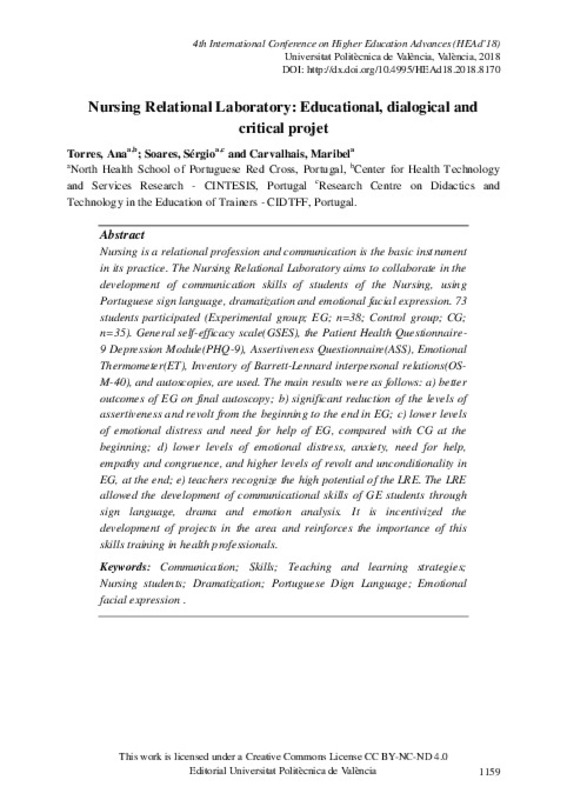JavaScript is disabled for your browser. Some features of this site may not work without it.
Buscar en RiuNet
Listar
Mi cuenta
Estadísticas
Ayuda RiuNet
Admin. UPV
Nursing Relational Laboratory: Educational, dialogical and critical projet
Mostrar el registro sencillo del ítem
Ficheros en el ítem
| dc.contributor.author | Torres, Ana
|
es_ES |
| dc.contributor.author | Soares, Sérgio
|
es_ES |
| dc.contributor.author | Carvalhais, Maribel
|
es_ES |
| dc.date.accessioned | 2018-10-05T13:38:40Z | |
| dc.date.available | 2018-10-05T13:38:40Z | |
| dc.date.issued | 2018-07-02T13:38:40Z | |
| dc.identifier.isbn | 9788490486900 | es_ES |
| dc.identifier.issn | 2603-5871 | |
| dc.identifier.uri | http://hdl.handle.net/10251/109736 | |
| dc.description.abstract | [EN] Nursing is a relational profession and communication is the basic instrument in its practice. The Nursing Relational Laboratory aims to collaborate in the development of communication skills of students of the Nursing, using Portuguese sign language, dramatization and emotional facial expression. 73 students participated (Experimental group; EG; n=38; Control group; CG; n=35). General self-efficacy scale(GSES), the Patient Health Questionnaire-9 Depression Module(PHQ-9), assertiveness questionnaire(ASS), Emotional Thermometer(ET), Inventory of Barrett-Lennard interpersonal relations(OS-M-40), and autoscopies, are used. The main results were as follows: a) better outcomes of EG on final autoscopy; b) significant reduction of the levels of assertiveness and revolt from the beginning to the end in EG; c) lower levels of emotional distress and need for help of EG, compared with CG at the beginning; d) lower levels of emotional distress, anxiety, need for help, empathy and congruence, and higher levels of revolt and unconditionality in EG, at the end; e) teachers recognize the high potential of the LRE. The LRE allowed the development of communicational skills of GE students through sign language, drama and emotion analysis. It is incentivized the development of projects in the area and reinforces the importance of this skills training in health professionals. | es_ES |
| dc.description.uri | http://ocs.editorial.upv.es/index.php/HEAD/HEAD18 | es_ES |
| dc.format.extent | 9 | |
| dc.language | Inglés | es_ES |
| dc.publisher | Editorial Universitat Politècnica de València | es_ES |
| dc.relation.ispartof | 4th International Conference on Higher Education Advances (HEAD'18) | |
| dc.rights | Reconocimiento - No comercial - Sin obra derivada (by-nc-nd) | es_ES |
| dc.subject | Higher Education | es_ES |
| dc.subject | Learning | es_ES |
| dc.subject | Educational systems | es_ES |
| dc.subject | Teaching | es_ES |
| dc.subject | Communication | |
| dc.subject | Skills | |
| dc.subject | Teaching and learning strategies | |
| dc.subject | Nursing students | |
| dc.subject | Dramatization | |
| dc.subject | Portuguese Dign Language | |
| dc.subject | Emotional facial expression | |
| dc.title | Nursing Relational Laboratory: Educational, dialogical and critical projet | es_ES |
| dc.type | Comunicación en congreso | es_ES |
| dc.type | Capítulo de libro | es_ES |
| dc.identifier.doi | 10.4995/HEAD18.2018.8170 | es_ES |
| dc.rights.accessRights | Abierto | es_ES |
| dc.description.bibliographicCitation | Torres, A.; Soares, S.; Carvalhais, M. (2018). Nursing Relational Laboratory: Educational, dialogical and critical projet. Editorial Universitat Politècnica de València. 1-8. https://doi.org/10.4995/HEAD18.2018.8170 | es_ES |
| dc.description.accrualMethod | OCS | es_ES |
| dc.relation.conferencename | Fourth International Conference on Higher Education Advances | es_ES |
| dc.relation.conferencedate | Junio 20-22,2018 | es_ES |
| dc.relation.conferenceplace | Valencia, Spain | es_ES |
| dc.relation.publisherversion | http://ocs.editorial.upv.es/index.php/HEAD/HEAD18/paper/view/8170 | es_ES |
| dc.description.upvformatpinicio | 1 | es_ES |
| dc.description.upvformatpinicio | 1159 | |
| dc.description.upvformatpfin | 8 | es_ES |
| dc.description.upvformatpfin | 1167 | |
| dc.type.version | info:eu-repo/semantics/publishedVersion | es_ES |
| dc.relation.pasarela | OCS\8170 | es_ES |








